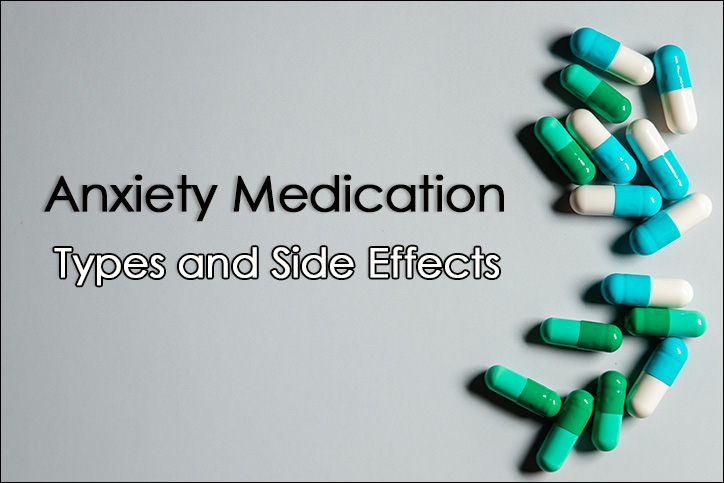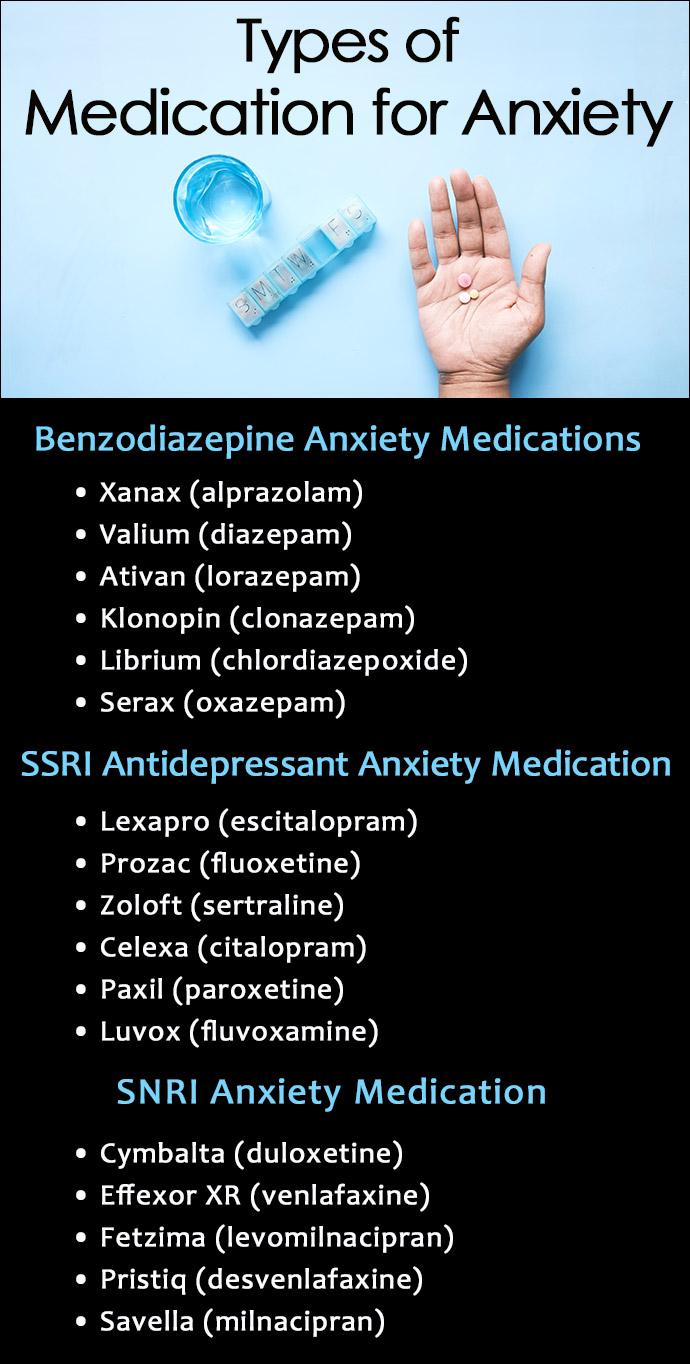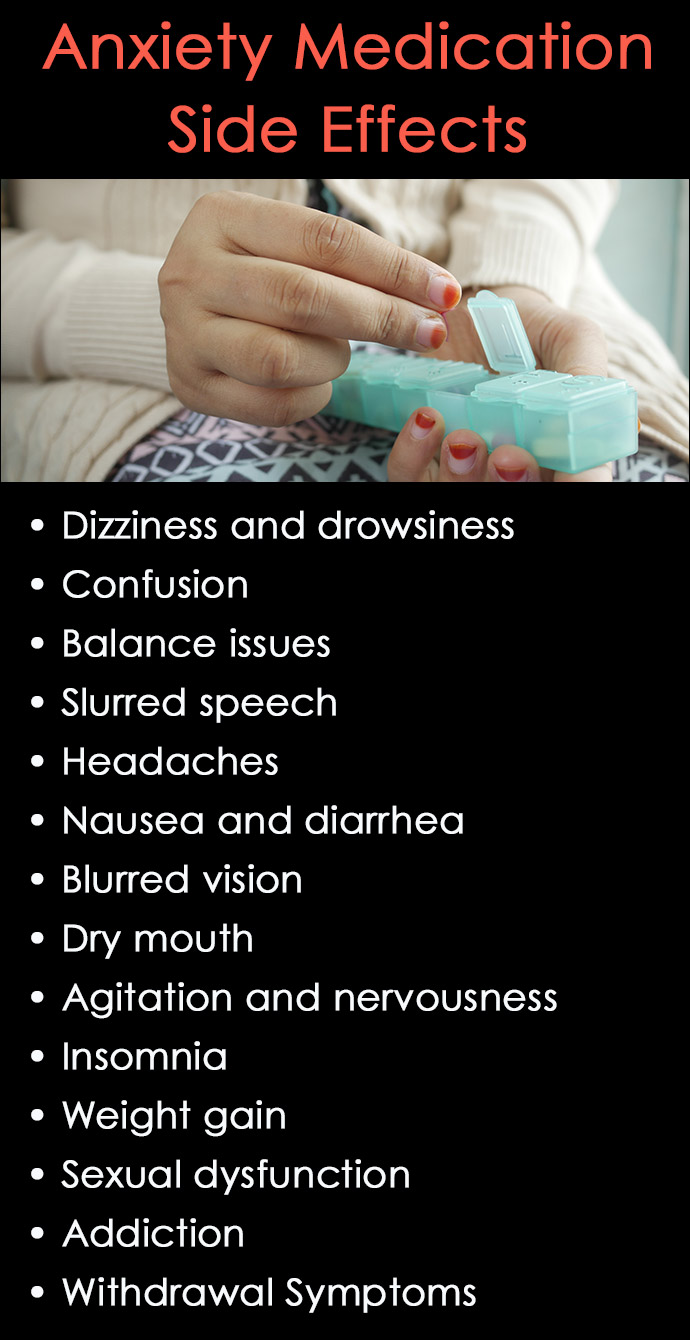Table of Contents
Anxiety medication can be an effective way for treating numerous types of mental health issues like anxiety, stress, and even depression.
However, it’s important to understand that anti anxiety meds are not a cure for anxiety disorders, they can cause serious side effects, and there are other drug-free treatment approaches that may work just as well for some people.
How Does Anxiety Medication Work?
There are different types of anxiety medications, just as there are different types of anxiety.
In many cases, anxiety medications are prescribed when a person has been diagnosed with one of the six types of anxiety disorders.
In general, meds for anxiety work to calm the limbic system of the brain, which is responsible for emotions, or modulate neurotransmitters like serotonin that regulate mood.
The medications are often combined with other forms of treatment, such as counseling, psychotherapy, and self-care strategies.
While anti anxiety medication can sometimes provide relief from the immediate and often crippling symptoms, counseling works to identify and treat the underlying causes of anxiety, such as trauma, a substance use disorder, or other mental health issues.
Because there are different types of anxiety meds, determining which one will work best can only be decided after working with a physician who continually monitors and adjusts the treatment plan as needed.
Types of Anxiety Medication
Benzodiazepines and antidepressants are two of the most common anti anxiety medications.
Both types of medications can be useful for the symptoms of anxiety, but they are used in different ways.
For severe symptoms, benzodiazepine anxiety drugs like Xanax, Ativan, and Klonopin can help people in as little as 30 minutes. However, these powerful, habit-forming drugs, should typically only be prescribed for short-term use.
Selective serotonin reuptake inhibitors (SSRIs) are antidepressant medications like Zoloft, Paxil, Prozac and Lexapro, that are less habit forming than benzos and can be useful in treating symptoms of anxiety, though these medications can take as long as 2 to 4 weeks before they become effective.
Understanding the pros and cons of these two classes of drugs, as well as how both types of anxiety medications interact with the body can help doctors and patients make informed choices when treating anxiety.
Benzodiazepine Anxiety Medication
Benzodiazepines are central nervous system depressants, meaning they work to slow down areas of the body and brain, which can help people suffering from anxiety both physically and mentally.
However, these drugs are very strong and can produce serious and unwanted side effects that may require benzo withdrawal treatment.
Benzodiazepine Anxiety Medication Names
Listed below are some of the most common benzo anti anxiety meds. Like with other drugs, the anxiety medication names below list the brand name first and the generic name in parentheses.
- Xanax (alprazolam)
- Valium (diazepam)
- Ativan (lorazepam)
- Klonopin (clonazepam)
- Librium (chlordiazepoxide)
- Serax (oxazepam)
Even at low doses, some people become foggy, sleepy, and experience a loss of coordination after taking them the night before.
Side effects of benzodiazepine anxiety medication can include:
- Dizziness and drowsiness
- Confusion, trouble concentrating and remembering things
- Balance and coordination issues
- Slurred speech
- Headaches
- Nausea
- Blurred vision
- Addiction
- Withdrawal symptoms
Another issue associated with benzodiazepines is a physical dependence, tolerance, and withdrawal. These problems tend to stem from misusing or abusing the drug, or from staying on them too long, even when directed by a doctor.
Physical dependence can happen in as little as a few weeks.
It’s also important to know that mixing benzodiazepines with other drugs, especially alcohol, can lead to a fatal overdose.
For people who have developed a physical addiction to benzos, quitting can be exceptionally difficult because of the painful withdrawal symptoms.
Anyone caught in the grip of this problem should seek help before stopping the drugs.
Benzodiazepine withdrawal can include some of the following symptoms:
- Body aches
- Sweating and shivers
- Restlessness
- Elevated heart rate
- Increased anxiety and panic attacks
- Difficulty concentrating, focusing and feeling confused
- Insomnia, difficulty getting to sleep, or staying asleep
- In very severe cases, seizures can occur
Recovery from an addiction to benzos is possible, but it requires medical supervision and gradually tapering off the drugs after benzodiazepine withdrawal and detox treatment.
Individual or group counseling, and if appropriate, family therapy can help address negative patterns and choices that drive addictive behaviors.
SSRI Antidepressant Anxiety Medication
Selective Serotonin Reuptake Inhibitors (SSRIs) are antidepressant drugs that increase the amount of serotonin in the brain, and they have a lower risk of dependency and abuse than with some other anxiety pills.
Serotonin is a type of neurotransmitter that helps brain cells communicate with each other and is thought to have an impact on the symptoms of anxiety and depression.
For people looking for a non benzodiazepine anti anxiety medication, SSRIs might be an effective solution.
Approved SSRI anxiety medications include:
- Lexapro (escitalopram)
- Prozac (fluoxetine)
- Zoloft (sertraline)
- Celexa (citalopram)
- Paxil (paroxetine)
- Luvox (fluvoxamine)
One issue with SSRIs is that it can take time, in some cases months, to find the right type or dose that will be effective for a person’s particular body chemistry and anxiety symptoms.
After that, it may take several weeks before a person starts to find relief from their symptoms, which can make it feel like the medication is not working fast enough.
Common SSRI anxiety medication side effects can include:
- Dry mouth
- Headaches
- Nausea and diarrhea
- Fatigue and drowsiness
- Agitation and nervousness
- Insomnia – difficulty getting or staying asleep
- Weight gain
- Sexual dysfunction
While people can stay on SSRI anxiety medications for longer periods of time, it’s important to not stop taking SSRIs all at once. Physicians suggest people gradually taper of the meds to avoid withdrawal symptoms.
SSRI withdrawal symptoms may include:
- Spike in depression and anxiety
- Fatigue
- Irritability
- Insomnia
- Flu-like symptoms
SNRI Anxiety Medication
Serotonin-Norepinephrine Reuptake Inhibitors (SNRIs) are similar to SSRIs except they increase levels of serotonin and also norepinephrine neurotransmitters in the brain.
Norepinephrine is a neurotransmitter and a hormone that has an impact on a person’s acute stress response that is more commonly called the “fight or flight response” that is related to anxiety.
SNRIs for anxiety include:
- Cymbalta (duloxetine)
- Effexor XR (venlafaxine)
- Fetzima (levomilnacipran)
- Pristiq (desvenlafaxine)
- Savella (milnacipran)
SNRIs have many of the same anxiety medication side effects as SSRIs, but because they also affect norepinephrine, the effects may be slightly different or more severe.
In addition to benzodiazepines, SSRIs, and SNRIs, there are several other types of anxiety medications that are sometimes used as “off label” to help treat the symptoms.
Other Types and Off Label Anxiety Medication
Off-label drug use is a term that means a doctor prescribes a medication for a condition other than what the FDA originally approved it for.
There are several types of off label anxiety medications that can be effective for treatment.
Beta Blockers
Beta blockers are generic drugs, like propranolol and atenolol, that are approved for the treatment of high blood pressure and some heart conditions. These medications work by blocking the effect of norepinephrine, often referred to as a stress hormone.
Because beta blockers help decrease some physical symptoms of anxiety, such as rapid heart rate, shaky hands, dizziness, sweating, and a trembling voice, they are sometimes prescribed as an off label anxiety medication.
Some common side effects of beta blockers include:
- Headaches
- Nausea and diarrhea
- Constipation in some people
- Fatigue, weakness, and sleepiness
- Dizziness
Hydroxyzine
Another off-label anxiety medication is hydroxyzine, an antihistamine used to treat allergic reactions. The medication works by changing the body’s level of histamine and serotonin, which can lead to changes in mood.
As an anxiety medication, this off-label drug is typically used immediately as a short-term, fast working solution when symptoms occur.
Possible side effects of hydroxyzine include:
- Headaches and constipation
- Dry mouth
- Dizziness and drowsiness
- Confusion
Treating Anxiety Without Medication
Anxiety medication can be quite effective for helping people reduce the symptoms of anxiety, but it is not a cure.
With that in mind, it’s important to remember there are non-medicinal treatments that often work just as well as drugs without the negative side effects of anxiety medication.
These are often referred to as therapeutic or self-care strategies, and they can be used in conjunction with or without a therapist.
Non-medication anxiety treatments can foster both quick relief and lasting recovery.
Exercise
As little as 30 minutes of regular exercise a day has shown to ease the symptoms of stress and anxiety for many people.
For some individuals, this may mean simply taking regular walks or leisurely bike rides. For others, a few days of intense workouts or difficult hikes are what it takes to relieve stress and anxiety.
Low impact activities such as yoga and tai chi serve as physical exercise for the body and add a mental element that calms the mind as an alternative to anxiety medications.
Eating Healthy Foods
A healthy, well-balanced diet full of lean proteins, fresh vegetables, and fruits can help people maintain steady energy levels and avoid spikes and crashes in blood sugar that have a negative impact on mood.
Avoiding alcohol and drugs helps people make better diet choices and decreases changes in neurotransmitters that affect anxiety and depression.
Treatment Therapies
Anxiety medications often work best when combined with treatment therapies such as Cognitive Behavioral Therapy (CBT) or IFS Therapy, that teach people how to change their negative thoughts that cause anxiety, or understand why they are having them.
Medications may be helpful in the short term for dealing with symptoms temporarily, but therapy can help a person understand why anxiety is happening, and find ways to diminish or stop it from happening in the long-term.
When therapy techniques are mastered, it can alleviate the need for many common anti anxiety medications altogether and provide a lasting recovery.
Meditation and Mindfulness
Meditation is the practice of focusing on the body and breath. It can be done in any comfortable, quiet setting, and helps relax the brain.
As thoughts come into the mind, the key is to observe them without judgment, let them pass, and return the focus to the body and breathing.
Mindfulness is similar to meditation, although it can be done while exercising or doing chores around the house, such as washing dishes.
In its simplest terms, mindfulness involves being fully present in the moment and only thinking about the current task at hand, instead of the past or future, which can cause stress or anxiety.
For people who struggle with anxiety, finding solutions to live a more peaceful and productive life can be difficult.
Anxiety medication can serve as a quick fix for overcoming the symptoms, but it does have side effects, and won’t work for everyone. Finding healthier ways that offer relief should serve as the long-term goal for healing from anxiety.
Frequently Asked Questions
Is Hydroxyzine habit forming?
Hydroxyzine is an antihistamine and a non benzodiazepine anti anxiety medication. It acts as a central nervous system depressant and is not a controlled substance, so it is considered to have a lower potential for abuse or addiction than benzos and other anxiety meds.
Even though Hydroxyzine is not considered addictive, prolonged use can cause a tolerance that may lead to a physical or psychological dependence and withdrawal symptoms such as insomnia, so it should only be used as directed.
What is the fastest acting anxiety medication?
Benzodiazepines are a calming medication intended for short term use and are typically the fastest acting anti anxiety meds. Xanax, Ativan, and Valium are all examples of fasting acting anxiety medications, but they should only be used for short-term use because of the addictive nature of benzodiazepines.
Who can prescribe anti anxiety medications?
Medical doctors, primary care physicians, and psychiatrists can all prescribe medication for anxiety. In some states, psychiatric nurse practitioners can diagnose and prescribe anti anxiety drugs, while they are only authorized in other states to prescribe them under the supervision of a psychiatrist or qualified physician.
Are there any over the counter medications for anxiety?
There are several over the counter options that may be effective for treating mild anxiety for some people. These include supplements and herbs like chamomile, lavender, and valerian root, or the natural hormone melatonin. Antihistamines like Benadryl might also be effective.





